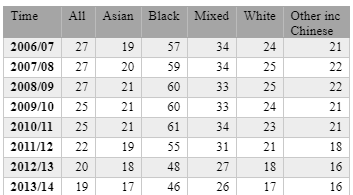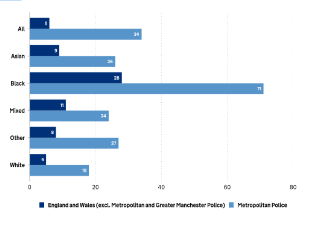The United Kingdom Biased Policing Culture
- 6 Pages
- Published On: 14-12-2023
Abstract— Policing has, over the past decade, received several critics particularly on regard on discrimination in arrests, responding to crimes, killings, and profiling. In the UK, the stop and search techniques is some of the cited ways in which police bias and discrimination was apparent. From literature, several studies and survey indicate widespread distrust of the police rooted of traditional ‘profiling culture’ and bias. For this study, the data, acquired from the UK government website, the Office of the National Statistics, and the UK police is analysed using python computing language. The findings indicate a significantly high correlation between rate per 1,000 and individual race. Blacks and Mixed people are more likely to be arrested compared to other race.
Chapter 1: Introduction

Discrimination by the enforcement agency has been a subject of discussion and concern particularly over the past decade. In the wake of the cases of police discrimination in not only countries as the United States of America (US), the United Kingdom (UK) police has also seen big share of criticism on discrimination, biasness, and racism [1]. According to the survey conducted by ITV, indicate 77% of the black people saying policing had a culture of race profiling. The findings also indicate 59% of the minority and 42% of the White hold a view that police has a ‘culture of racism’ [2]. In a separate survey for the charity Hope Not Hate, the findings showed near same perception of policing culture towards race. According to the survey, 80% of the Black Britons held that “police are biased against people from my background and ethnic group”. Similar ratio of Bangladeshi Britons had same sediments [3]. Moreover, 65% of all the ethnic minorities holding police have race profiling culture. The findings further indicate 58% of Black believes they are more likely to be stopped and searched while 71% of Bangladeshi Britons and 53% Indian Britons believing prejudged against by police [4]
This project focuses on exploring the police discrimination during arrest by profiling the people from BAME community. It aims to accomplish this by developing disparities in police arrest of the people from different backgrounds.
Chapter 2: literature review
Introduction
The study reviews existing literature on racial police profiling, discrimination, bias, and systematic racism in policing. This is essentially a comprehensive reviewing of the prior researches linked to the research topic to offer a deeper understanding and wide view of the problem.
Background/Literature review
Regarded as first attempt to address the issues of racism and discrimination by the polices, a 1981 report by Lord Scarman indicated the Brixton routs occurred due to ‘a loss of confidence’ in the police rather than planned riots as had been thought earlier [5]. The report further point out ‘racially prejudiced conducted’ by law enforcement terming it as ‘institutional racism’ where racial discrimination behaviour has been normalised within the enforcement and police systems. As highlighted by Vomfell and Stewart, the call for restructuring to institute and build more with the public has been received positively [6].
However, the recent incidence and accusations of discrimination by police tell and depicts a different perspective. According to the stop and search data, there were 11 stops for every 1,000 people in 2019-2020 a significant drop from 25/1000 in 2009-2010 [7]. However, in exploring the data based on the ethnic backgrounds, Black Caribbean had the highest stops (39/1000) then followed by Black African people (34/1000). The data showed that Asian people were stop at a rate of 30/1000 while Whites were stopped at a rate of 6 per 1,000.
Vomfell and Stewart attributed the disparities of the Asian people to over-patrolling while the high rate of Black people stop and search was linked to both officer and patrol effects but officers’ biases showed significant correlation as a contributing factor [6]. However, police profiling creates distrust that result in higher animosity and anger among the profiled communities (Blacks and Asians) against the police.
Chapter 3: Methodology
In this chapter, this study outlines ways in which the data was obtained, evaluated, analysed and presented. It describes the methods used in data collection and then analysis in the research process. As stated, the focus of the study is on biasness in police arrests based on individual race.
The data set for this study was obtained from the UK government, the Office of the National Statistics, and the UK police. The dataset captures the number of arrest by police from 2006/07 to 2018/19 then categorised based on arrested persons ethnic backgrounds. The aim of this research is to explore the dataset by applying different analytic tools such as regression in attempt to establish correlation between ethnic background and arrest rate.


Using pre-processors, regression, test splits, algorithms, and validations tools, the study explores the disparities in arrest across people of different ethnicities that include Whites, Blacks, Asians, and Mixed races. However, before analysis, evaluation of the data through cleaning techniques, imputation, and splitting will be done. A python algorithm is used to map out and establish correlation in arrests and people ethnicity. Although some researchers perceive machine learning approach can depict a better perspective of ethnic bias and systemic racism in policing, critics argue that it does not take into account such variables as race, gender, and distribution [8].
Chapter 4: Results
The data captures number of arrest per year between 2006/07 and 2018/19. For instance, in 2006 there were 1,474,843 police arrest while in in 2018/1, it had fallen to 671,126 people arrested. As shown in Figure 2, compared to the other ethnic groups, people from the Black background have experience significantly high arrest rate/1000. In 2006/07, the rate of Black people stood at approximately 56/1000 rising the highest in year 2010/11 (60 arrest per 1000). The arrest particularly of the Black has gradually reduce over the years recording the lowest rate in 2018/19 (32 per 1000). People from Mixed background come second in likelihood of being arrested over the measured period. In 2018/19, arrest of 18/1000 arrest occurred for mixed race group a drop from 34 per 1,000 people (Figure 2).
Comparatively, arrested individuals from Whites backgrounds were 24 per 1,000 people in 2006/07 dropping to 10 arrests per 1,000 people in 2018/19. The Asians arrests occurred at a rate of 19 per 1000 individuals in 2006/07, remaining relative the same to 2012/13, and then dropping to 12 arrests per 1,000 individuals in 2018/19. On the other hand, individuals grouped under ‘Others inc Chinese’ category saw arrest almost similar to that of Asians counterparts with arrest per 1,000 individuals standing at 21 between 2006/07 and 2010/2012 then decreasing gradually to 12 arrest per 1,000.

Chapter 6: Discussion
Following the George Floyd’s death and demonstration in the US, Independent Office for Police Conduct (IOPC) investigated the racism discrimination and its extent in the UK [9]. The report indicated such policing tactics as stop and search profiled the minority, where reports in 2018 indicating BAME people are 9 time more likely to be stopped and searched, and eight times more likely for Taser to be used against them [10]. The metropolitan police officers from Black, Asian, and Minority Ethnic groups (BAME) have increased gradually from 4.4% in 1999 to 10% 2011. However, the report published by Gov.UK (2021) on police workforce capturing law enforcement across the country show 92.7% of the police officer were White while remaining 7.3% from the BAME [11]. Continue your journey with our comprehensive guide to Impacts of Knife Crime on Victims, Youth, and Communities in the UK.

As shown by the findings, the Blacks and Mixed raced individuals are more likely to be arrested by the police than any other race group. Some critics have argued that this disproportional representation is the root cause of the discrimination and biases seen. In 2010, Equity and Human Rights Commission reported that the likelihood of a black person to be stopped was six times higher than a White person while for an Asian person was twice across England and Wales. According to the data from Commission on Race and Ethnic Disparities (Figure 1), Metropolitan police had a significantly high stop and search rate against the minority compared to the other part of England and Wales [12].

Conclusion
In exploring the disparities in policing, Commission on Race and Ethnic Disparities found that people from black ethnic groups are likely to be arrested. The findings show positive link between race and arrest rate per 1000, where Black and Mixed ethnic groups are more likely to be arrested compared to Whites.
References
Ashford, J., 2020. Black Lives Matter protests: do UK police have a race problem?. [online]
Theweek.co.uk. Available at:
ITV News, 2020. ITV poll finds 77% of black people think police has ‘a culture of racism’ | ITV News.
[online] ITV News. Available at:
The Guardian, 2020. 65% of minority ethnic Britons say police are biased against them. [online] the
Guardian. Available at:
BBC, 2020. Ethnic minorities feel UK police are racially biased, report says. [online] BBC News.
Available at:
Newburn, T., Diski, R., Cooper, K., Deacon, R., Burch, A. and Grant, M., 2018. ‘The biggest gang’? Police and people in the 2011 England riots. Policing and Society, 28(2), pp.205-222.
Vomfell, L. and Stewart, N., 2021. Officer bias, over-patrolling and ethnic disparities in stop and search. Nature Human Behaviour, pp.1-10.
Nawaz, A. and Tankebe, J., 2018. Tracking procedural justice in stop and search encounters: coding evidence from body-worn video cameras. Cambridge journal of evidence-based policing, 2(3-4), pp.139-163.
Babuta, A., Oswald, M. and Rinik, C., 2018. Machine Learning Algorithms and Police Decision-Making. Legal, Ethical, and Regulatory Challenges, pp.3-18.
Dodd, V., 2020. Police in England and Wales face inquiry into possible racial bias. [online] the
Guardian. Available at:
Giordano, C. and Gregory, A., 2020. Police watchdog to investigate whether force is institutionally
racist. [online] The Independent. Available at:
Gov.UK, 2021. Police workforce. [online] Ethnicity-facts-figures.service.gov.uk. Available at:
10] Commission on Race and Ethnic Disparities- Gov.UK, 2021. Crime and policing. [online] GOV.UK.
Available at:
Leslie, C., 2020. Police racism inquiries in the UK: Do they change how things work?. [online] BBC News.
Available at:
- 24/7 Customer Support
- 100% Customer Satisfaction
- No Privacy Violation
- Quick Services
- Subject Experts



